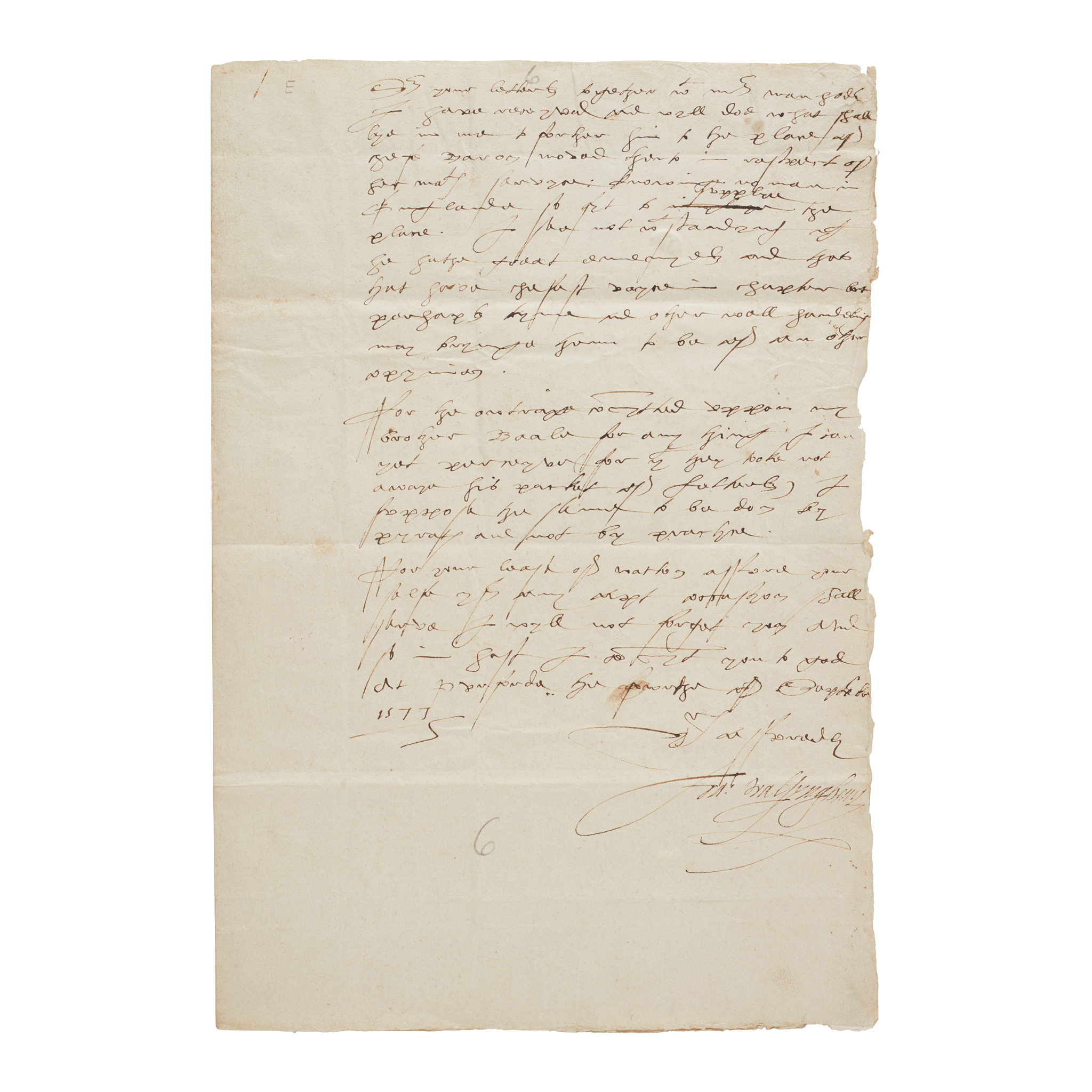Walsingham, Sir Francis (c.1532-1590)
Autograph letter signed as principal secretary, to Sir Thomas Heneage, 4th September, 1577
£4,788
Rare Books, Manuscripts, Maps & Photographs
Auction: 07 February 2024 from 10:00 GMT
Description
1 page, folio (31.2 x 21.2cm), with conjugate address leaf, full text reads, ‘By your letters together with Mr Manwoods I have receyved and wyll doe what shall be in me to further him to the place of Chief Baron, moved therto in respect of her ma[jesty’]s service, knowing no man in Englande so fit to supplie the place. I be not withstandyng if he hathe great enemyes, and those that have chiefest voyce in chapter but perhaps tyme and other well handeling may bring them to be of an other opynion. For the outrage committed uppon my brother Baale [Beale] for any thing I can yet perceyve, for if they tooke not awaye his packet of letters, I suppose the same to be done by pyrates and not by practyce. For your last of matters, assure yourself, if my next occasion shall serve, I wyll not forget you and so in haste I commit you to God. At Purforde the fourth of September 1577, Yours assuredly Fra. Walsingham', endorsed, address leaf with seal tear not affecting text
Footnote
Elizabeth's principal secretary and spymaster conspires with his fellow politician and courtier Sir Thomas Heneage (c.1532-1595) to install a controversial ally in the important post of chief baron of the exchequer. Notorious for his hard dealings in property transactions, Roger Manwood (1524/5-1592) accrued a coterie of powerful enemies; the principal opponent to his appointment as chief baron may have been William Cecil, perhaps on the grounds of Manwood's 'profound commitment to the common law as the subject's protection, and his dislike of the intervention of the privy council at the petition of favoured individuals' (ODNB). Manwood was also the dedicatee of Reginald Scot's The Discovery of Witchcraft (1584), and the judge at Christopher Marlowe's trial for murder in 1589. He permitted Marlowe's release without charge, in which regard it may be significant that the playwright had in 1587 briefly been employed as an agent of Walsingham's.
The career of diplomat and administrator Robert Beale (1541-1601), ‘my brother Baale', was closely entwined with Walsingham's. Having accompanied Walsingham on his embassy to Paris in 1570, he subsequently married the sister of Walsingham's wife, and deputised for him on several occasions as principal secretary during his (Walsingham's) absences from court. In 1577 he was dispatched to Germany to bring about a reconciliation between the region's protestant factions and thereby strengthen international resistance to the forces of Catholicism. His ship was raided by pirates while crossing the channel, with Walsingham's letter implying his great relief that no sensitive documents relating to the mission had been taken. Later, as clerk of the privy council, Beale was heavily involved in deciding the fate of Mary Queen of Scots, delivering her sentence of death at Fotheringhay in November 1586, and her signed death warrant in February the following year.
Provenance:
1. By Descent to Allan George Finch (see Historical Manuscripts Commission, Report on the Manuscripts of Allan George Finch, Esq., of Burley-on-the-Hill, Rutland (2 vols, London: HMSO, 1913-22), vol. 1 p. 22).
2. Sotheby's, Valuable Printed Books, Science, Autograph Letters and Historical Documents, 18th-19th July 1966, lot 511 (in section ‘The Property of Lt.-Col. J. R. Hanbury’)
3. Bernard Quaritch, Autographs and Manuscripts (catalogue 931), 1973, item 739

